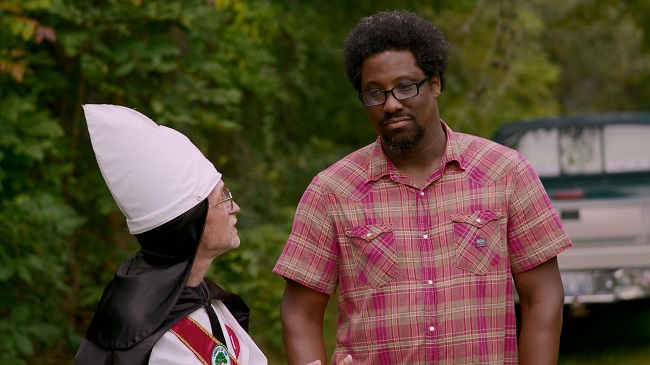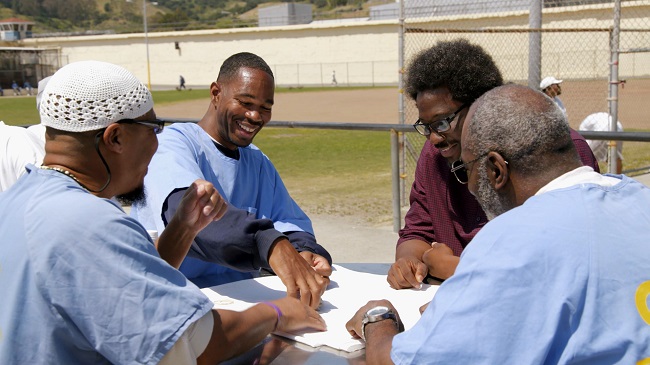

Comedian W. Kamau Bell wants to spark conversations about society with his new CNN docuseries United Shades of America. In eight episodes, the perceptive, six-foot-four Bay Area native travels and interacts with ethnically distinctive communities to make sense of the cultural dynamics penetrating those people.
The extremely thorough, mini Afro-wearing former star of the now-defunct FX comedy series, Totally Biased, embarks on journeys to places where the average person may completely feel uncomfortable. He puts his observations in context by interjecting witty narration, snippets of his stand-up routines, historic overviews and interviews with numerous local subjects.
The end result is a groundbreaking style of cultural anthropology married to sociological humor. “Comedy is all about asking questions and looking at the world from a critical perspective,” insists a very relaxed Bell following a screening of United Shades of America in Atlanta. “It helps me get to places other people can’t get to sometimes. I’m just using the skills I got.”
United Shades of America’s pilot episode follows Bell to a series of rural towns where Ku Klux Klan chapters are present. Bell experiences first-hand a cross burning, a self-proclaimed hooded Christian meeting him at night on a dirt road for a brief chat, meeting a neo-Nazi educator at a school where kids of different races can’t play together and visits the set of a web series hosted by a conservative minster and his daughter spreading hate speech.
On the other hand, the admittedly curious host of the San Francisco-based talk radio show Kamau Right Now! and co-host of the podcast Denzel Washington is the Greatest Actor of All Time Period connects with a special interest group that seeks to create a welcoming community.
Bell shares what satisfaction he gains from doing United Shades of America. “It gives me more empathy for people,” declares the Berkeley, CA resident. “If people come to the table with good faith, I can have a conversation with anybody.”
All episodes of United Shades of America were taped a year before the show premiered. Originally titled Black Man, White America, the series was first pitched to CNN by a production company. Bell says he thought the show would reach its shelf life after the fourth episode, urging the show’s producers to concentrate on more multicultural perspectives. “I live in the Bay Area, so it doesn’t make sense to me to treat it like a black-and-white world,” stresses Bell.
The second episode of United Shades of America takes an ethnographic look inside of San Quentin State Prison. Unlike what is often portrayed in mainstream media, Bell gets to know the death row inmates as industrious individuals who learn trades and fully accept accountability for their actions. An Ambassador of Racial Justice for the American Civil Liberties Union (ACLU), Bell tours the racially segregated, geographically alienated prison grounds with staff members as well as the inmates.

“They were just great dudes,” says Bell, “and you just think about all of the wasted human potential that’s behind the bars of prison.”
Bell eats with the inmates, speaks their language making small talk and hears accounts about what mistakes led to their imprisonment. Along the way, the astute NAACP Image and GLAAD award-nominated humorist drops devastating statistics and observations that reveal the inequities that exist within the prison-industrial complex. Bell shares that seeing the inmates laugh made him appreciate his visit to San Quentin.
https://youtu.be/OudQkEKeCPo
“They were being more comfortable around me than if a journalist had been there,” declares Bell. “I wanted them to shine, not me.” Bell admits to not having much empathy for prisoners before he taped that second episode. As the show was being edited, the producers and editors wanted to show the conventional narratives about prison culture. A protective Bell thought it was important to provide an alternative to those expectations.
Bell comments on the pros and cons of collaboration but emphasizes how varying opinions and skill sets are important to bringing United Shades of America on-air. He also says he doesn’t want to misrepresent his relationships with ACLU and social justice organization Race Forward
“There’s a lot of negotiation back and forth about all of that stuff,” he says. “They put a lot of trust in me by giving me those titles. I try to make sure the work I do is in that lane. This is the work I like to do. I work really hard at it.”
United Shades of America is a project that fully aligns with Bell’s voice. Even Chris Rock, the executive producer of Totally Biased, lends his support if Bell ever needs it. Referring to Rock as his “guru in a glass case,” Bell is determined to set the tone of the show himself, not allow it to become too consumed by Rock’s influence.
“I don’t want people to think that I always have to use him to get everything done,” swears Bell scratching the back of his neck. “I’m happy I got this show off the strength of the work I’d done [with Chris] already. He’s been very supportive.”
Bell reiterates that United Shades of America should spark dialogue about making a difference. The show took the top slot for cable news in its premiere week, motivating Bell to believe recurring seasons are possible. He likes to think of himself as simply a comedian with a positive attitude who takes his sense of humor with him.
Nonetheless, he aspires for others to look at United Shades of America as a series that could aid in changing the system and empower others to find their niche in changing society. “Get in where you fit in,” says Bell with his hands in his pocket. “Figure out how to engage and what you can do to amplify the problem. Everybody in a way can make change.”
United Shades of America with W. Kamau Ball airs on Sundays at 10 p.m. ET on CNN. Check local listings.
This post was written by Christopher A. Daniel, pop cultural critic and music editor for the Burton Wire. He is also contributing writer for Urban Lux Magazine and Blues & Soul Magazine. Follow Christopher @Journalistorian on Twitter.
Follow The Burton Wire on Twitter @TheBurtonWire or Instagram.








